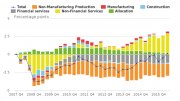There is a deep sense of frustration about how to stop and reverse the breakdown of understanding between ordinary people and the political leaders and decision makers who serve them, writes Geoff Kitney.
A dangerous loss of public confidence in the instruments of public policy making is feeding the rise of right-wing populism which poses the greatest challenge to mainstream political parties across the Western world.
Political strategists attempting to analyse the reasons for the erosion of trust in the major mainstream political parties in long-standing democracies are becoming increasingly alarmed at the deepening disdain for systems which have guided the democratic West’s post-war peace, prosperity and security.
Conversations Chief-exec.com has had with people who work behind the scenes to interpret the research and analysis of political trends which guide the major political parties have revealed a deep sense of frustration about how to stop and reverse the breakdown of understanding between ordinary people and the political leaders and decision makers who serve them.
Ordinary voters will increasingly turn away from the mainstream parties towards people they see as political outsiders untainted by what they regard as a corrupt and untrustworthy system.
The recent upheavals in France that have resulted from the reform policies of French President Emmanuel Macron are an open manifestation of a mood which these strategists say poses a grave threat to the ability of governments to maintain the trust of their communities in their democratic systems.
While economists, business leaders and policy experts say that reforms such as those being introduced by President Macron are fundamentally important to future economic growth and prosperity, worried analysts say that the loss of public trust in the political system may make it impossible to complete the reform process.
Recent internal research conducted for the Australian Labor Party, and sighted by Chief-exec.com, shows that voters in Australia increasingly see their political leaders as not worthy of their trust and support.
The polling finds that voters believe the mainstream political parties are only interested in governing for the politically influential and well-off “inner-city elites”. Voters in poorer and more distant population centres feel that they have been forgotten and ignored over issues such as immigration policy, industrial developments and infrastructure spending for vital needs, such as education and health services and social support for the poorest and most disadvantaged.
Officials involved in this research say that the findings appear to be largely consistent with the feedback being received by major parties in other countries.
And they warn that it is clear that unless the traditional political parties respond appropriately, ordinary voters will increasingly turn away from the mainstream parties towards people they see as political outsiders untainted by what they regard as a corrupt and untrustworthy system.
With populist political leaders attacking the role and the world of “experts”, a consequence of this could be that voters would be less likely to trust the advice of “experts”.
This was already clearly happening with the rising influence of the “anti-vaxer” movement which rejects the science behind mass vaccination programs for infectious diseases. Another example is the growing number of prominent figures – starting with United States President Donald Trump – who deny the science of climate change.
Another area cited by political analysts is the rise of resistance against collective action by like-minded nations which require sharing of national sovereignty. Brexit, they say, is the standout example of this and, even where this might be likely to result in loss of national income and wealth, this is seen as being a price worth paying for gaining control of a nation’s own affairs.
One manifestation of the tendency to reject the advice of experts who could be seen as being members of an elite group could be a loss of public confidence in the institutions which undertake the research on which policy is made.
As the Australian Labor Party’s spokesman on Innovation, Industry, Science and Research, Kim Carr, has pointed out, in Australia there are moves to strengthen guidelines for the allocation of research funds to ensure the research being undertaken is “in the national interest”. This is being done by a conservative government which has questioned the science of climate change and which has demonstrated a growing hostility to universities and academics who it perceives as tending to be left-leaning.
A powerful lobby group of conservative luminaries has just succeeded in persuading an Australian university to introduce a course in “Western civilisation” – a course which it says is needed to overcome a left-bias in Australian universities which tends to diminish or belittle the achievements of “Judeo-Christian” societies.
The conditions of the funding for these courses include giving the group that provides the funding significant influence over the content of the course and the way it is conducted, demands seen by some as setting a dangerous precedent for allowing outside influence over academic freedom.
Recent internal research conducted for the Australian Labor Party, and sighted by Chief-exec.com, shows that voters in Australia increasingly see their political leaders as not worthy of their trust and support.
On a larger scale, the findings that voters in Western democracies are increasingly rejecting public policy determined by governments comprising traditional mainstream political parties is being seen as posing big risks for population policy.
This is especially so as voters – and populists looking to win their support – are increasingly opposed to immigration and to so-called multi-culturalism. With Western countries facing slowing and, in some cases, shrinking natural population levels, longer-term economic growth and rising prosperity will require the immigration of skilled migrants to settle permanently in many countries. The risk that closed borders and falling populations will lead to economic contraction and loss of international competitiveness will only increase the dangers of economic stagnation and public anger with the political processes.
The growing evidence – that voters are losing trust and faith in those who govern them – compels new thinking and new approaches, especially to the widening gulf between the elites and the ordinary people.
Britain, France and the US will be where this will be tested most dramatically. But it will be the same story across the Western democratic world. The stakes for the West in how this is handled and resolved could not be higher.

Headline image credit: wellphoto/Shutterstock.com




